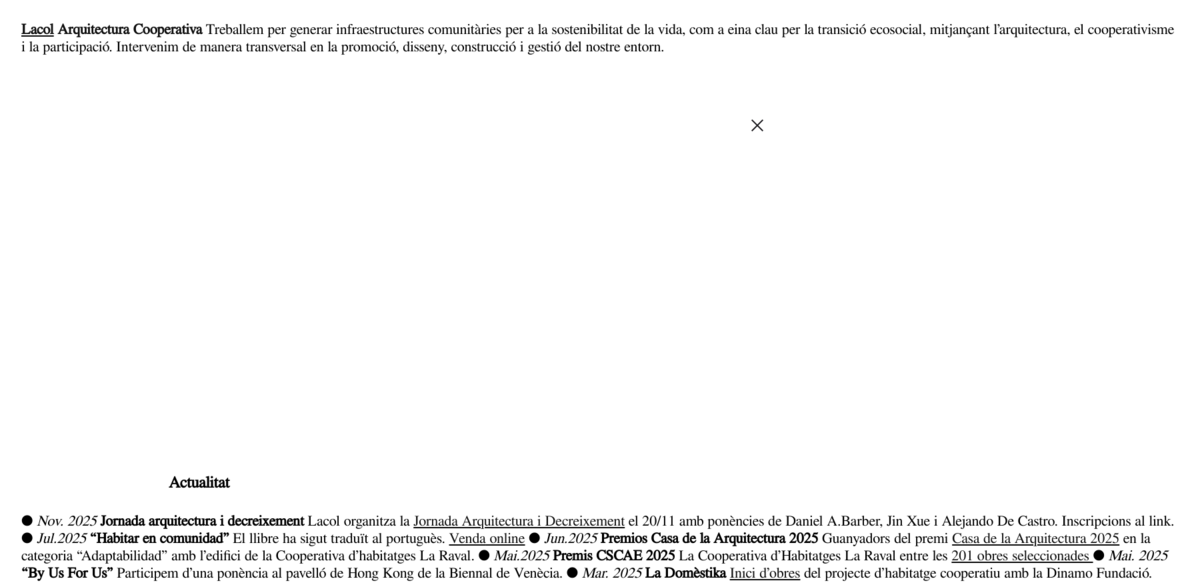What Lacol Architecture Is All About
Lacol Architecture is on a mission to create community infrastructures that support the sustainability of life. It’s not just about buildings — it’s about driving the ecosocial transition through a mix of architecture, cooperativism, and active participation. Their approach is transversal, meaning they get involved in everything from promoting ideas to designing, building, and managing the spaces we live in. It’s a holistic way of shaping environments that truly serve communities.
The Main Benefits of Lacol’s Work
Here’s a quick snapshot of what makes Lacol’s projects stand out:
- Winner of the European Collective Housing Award 2024 for the La Borda project.
- Recipient of the Ammodo Award in Social Architecture, recognizing their trajectory and innovative proposals.
- La Raval Housing Cooperative won the Casa de la Arquitectura Award 2025 in the “Adaptability” category.
- Over 200 projects selected for the prestigious CSCAE Awards 2025.
- Active participation in international events like the Venice Biennale, TEDxTarragona, and the Pan-American Architecture Biennial.
- Collaborations with foundations such as Dinamo Foundation for cooperative housing projects.
- Organizers of the Architecture and Degrowth Conference, featuring leading voices in the field.
Current Events Shaping Lacol’s Journey
Lacol keeps busy with a vibrant calendar of events and milestones. From groundbreaking ceremonies for new cooperatives like Abril, Sotrac, and Empriu, to inaugurations such as La Morada—a transfeminist housing cooperative—and La Raval in Manresa, their work is constantly evolving. They also engage globally, presenting at institutions like FHNW Basel and Columbia University’s GSAPP in New York. Plus, their projects get featured in exhibitions and magazines, including a special dossier in AV magazine issue 269. It’s a whirlwind of activity that keeps pushing boundaries.
Lines of Work Driving Change
Lacol’s work is organized around four main lines that reflect their commitment to sustainability and community:
- Construction Management: Providing expert support to streamline cooperative housing projects, ensuring they meet economic and time goals.
- Cooperative Housing: Offering an alternative to traditional housing models by fostering tenant-led, community-centered living spaces. This effort is amplified through the La Dinamo Foundation.
- Architecture Projects: Designing with sustainability at the core—balancing environmental, economic, and social factors while centering the user and community.
- Energy Transition: Imagining and building fair, democratic energy models that align with the principles of degrowth.
International Recognition and Collaborations
Lacol’s influence stretches far beyond local projects. Their participation in international festivals, biennials, and academic conferences highlights their role as thought leaders in social architecture. For instance, their involvement in the New European Bauhaus festival and exhibitions in Belgrade showcases their commitment to spreading cooperative housing ideas worldwide. Winning the Hamburg social housing competition and receiving awards like the Ammodo prize further cement their reputation as innovators who blend design with social impact.
Project Impact on Sustainable Development Goals (SDGs)
- SDG 11: Sustainable Cities and Communities – through cooperative housing and community infrastructure.
- SDG 7: Affordable and Clean Energy – via projects focused on energy transition and degrowth.
- SDG 10: Reduced Inequalities – by promoting inclusive, cooperative living models.
- SDG 13: Climate Action – integrating sustainability in architecture and construction.
- SDG 17: Partnerships for the Goals – collaborating with foundations, universities, and international organizations.
Looking Ahead: The Future of Lacol’s Work
With 15 years under their belt, Lacol is far from slowing down. Their ongoing projects, like the cooperative housing initiative La Domèstika with the Dinamo Foundation, and upcoming events such as the Architecture and Degrowth Conference, show a clear trajectory of growth and impact. The focus remains on creating spaces that are not only sustainable but also deeply rooted in community values. It’s about imagining new ways of living… and making them real.


















